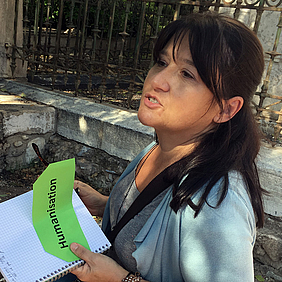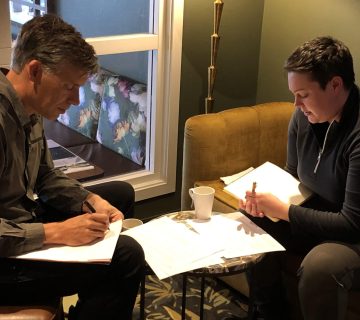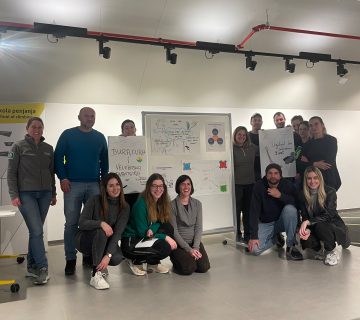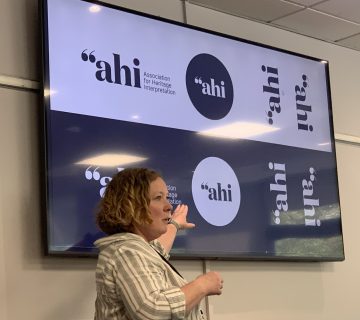Bringing a French accent to heritage interpretation in ancient Athens
IE’s training programme enjoyed a welcome boost from a French contingent of heritage and local development professionals from Saintes and Saint Jean d’Angely, in the Charente-Maritime Department, who travelled all the way to Athens to learn to become interpretive guides.
Despite doom-laden headlines to the contrary, Europe is still very much about mobility and exchange. Indeed, a European Erasmus+ adult education staff mobility grant, secured by the Abbaye aux Dames cultural heritage centre, opened the way for a very rewarding collaboration with Interpret Europe this October.
Twelve participants – site managers, visitor service agents, guides, tourist office advisors and youth workers – all threw their energy, ideas and determination into a 5-day CIG course* Run by Sandy Colvine and Valya Stergioti in the historic district of Plaka, at the foot of the omnipresent and inspiring Acropolis.
Bringing foreign participants to a seemingly well-known destination is a refreshing way to look at things from a different perspective. And this was no exception, with decrypting street art, the secret life of a park bench, a travelling horse figurine, shadow theatre and ancient Greek women’s high street fashion all forming the basis of some highly original and entertaining interpretive talks by the participants.
Whilst always challenging and intense, course feedback regarding how participants could use their new skills once home has been encouraging. For example, one of the tourist information office participants could advise a cognac producer looking to open his estate for visits on specific heritage interpretation approaches to sites and features, making for a much more meaningful visitor experience.
So, taking 12 French professionals to do a CIG course in French, in Athens, isn’t as crazy as it sounds and was a rich experience for both tutors and participants. In fact, it is to be recommended! Thank you, Vincent Soccodato at the Abbaye aux Dames, for letting us be part of this experience.
If you are interested in finding funding support for heritage interpretation training and study trips, Erasmus+ may provide you with some options.
*This CIG training course was funded with support from the European Commission Erasmus+ Programme.
Sandy Colvine is a British freelance rural development consultant and member of IE’s training team. He lives near Avignon, France, and you can contact him at sandy.colvine84@gmail.com.
To cite this article:
Colvine, S. (2016) ‘CIG course’. In Interpret Europe Newsletter 4-2016, 9
Available online:
https://www.interpret-europe.net/fileadmin/Documents/publications/Newsletters/ie-newsletter_2016-4_winter.pdf




